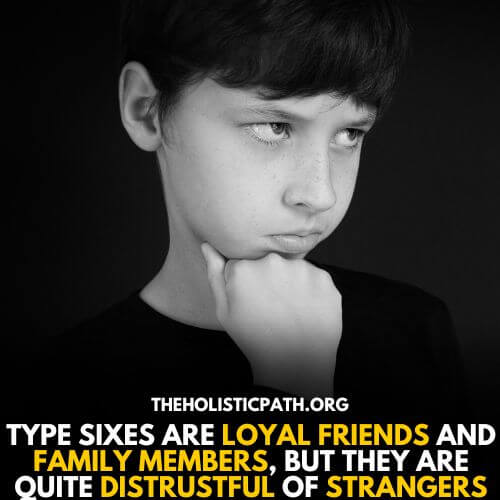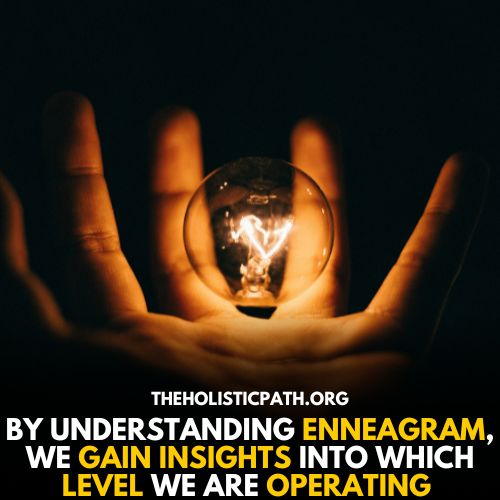Most of us think of our personality as being pretty straightforward. We have our quirks and our endearing qualities, and that’s just who we are. But what if there was more to it than that? What if our personality was actually made up of layers, each one influencing the other?
That’s the premise of the enneagram, a personality typing system that divides people into nine different types. Supporters of the enneagram believe that by understanding these layers, we can gain greater insight into our own personalities and the personalities of those around us.
The Enneagram
The Enneagram is a system that categorizes human personalities into nine different types. It’s a useful tool for understanding yourself and others. It can also be helpful in choosing careers, developing relationships, and managing stress.
– Explore Different Sides Of Your Personality With Enneagram
The enneagram can be a helpful tool for understanding the different facets of our personality and how they interact with each other.
For example, we might have a dominant personality type that tends to be more outgoing and assertive. But we might also have a secondary type that is more introspective and compassionate.
Understanding the enneagram can help us to recognize these different sides of our personality and learn to work with them in harmony.
– Enneagram A Tool For Understanding The Layers Of Personality
Most of us have a pretty good idea of what our personality type is. We know whether we’re extroverted or introverted, whether we’re logical or more emotional, and so on. But did you know that there’s a tool that can help you understand your personality even more deeply? It’s called the enneagram.
It can be used as a tool for understanding the layers of personality. Each point on the enneagram corresponds to a different type of personality. For example, people who are high in self-awareness tend to be at the center of the enneagram.
People who are high in self-control tend to be at the top of the enneagram. And people who are high in self-expression tend to be at the bottom of the enneagram. The enneagram can help you to understand your own personality and how it interacts with other personalities.
It can also help you to understand why you react to certain situations in certain ways.
Each enneagram type has its own unique set of strengths and weaknesses. By understanding which type you are, you can gain a better understanding of yourself and how you relate to others. For example;
If you’re an enneagram type 1 (the reformer), you’re likely to be analytical and idealistic. But you may also have a tendency to be critical and perfectionistic.
If you’re an enneagram type 2 (the helper), you’re likely to be generous and caring, but you may also have a tendency to be people-pleasing and needy.

No matter what your enneagram type is, understanding it can help you to become a more well-rounded person. By knowing your strengths and weaknesses, you can learn to work with them instead of against them. And by understanding how your enneagram type relates to other types, you can develop deeper relationships with the people in your life.
So to deepen our self-awareness, let’s explore the 9 personality types of enneagram. It just might help you to understand yourself in a whole new way.
9 Personality Types Of Enneagram
The nine personality types are:
1. Type One Personality: The Reformer
The Reformer and people who fall into this category tend to be idealistic, principled, and analytical. They are always looking for ways to improve both themselves and the world around them. They have a strong sense of right and wrong.
Reformers are also usually very independent and self-sufficient, preferring to work on their own rather than in a team.
Some famous examples of people with this personality type include Mahatma Gandhi, Nelson Mandela, and Mother Teresa.
While they can sometimes be seen as unrealistic or inflexible, Reformers are generally kind-hearted and well-intentioned people who care deeply about making the world a better place.
2. Type Two Personality: The Helper
People with this personality type are generally very compassionate and caring. They are often drawn to helping professions, such as nursing or teaching. Helpers are often good at giving advice and offering support to those who need it.

There are layers to the Helper personality, however. While they may be generous and kind, they can also be overly involved and even manipulative. Helpers need to be careful not to take on too much, or they may end up feeling overwhelmed themselves.
It’s all about finding a balance.
Above all, Helpers just want to feel needed and useful. If you think you might be a Helper, ask yourself if you often find yourself in the role of caretaker, both in your personal life and in your professional life. Do you like being the one who provides support for others?
If so, then it’s likely that you have the Helper personality type.
3. Type Three Personality: The Achiever
The Achiever personality of the enneagram is someone who layers their sense of self with their accomplishments. They are the ones whose “to-do” lists are never-ending, and they strive for excellence in everything they do.
They have a great need to be productive and often feel restless if they’re not. The Achiever is always looking for ways to improve and grow, both personally and professionally. They are competitive, but also highly cooperative.
They want to be seen as successful and often put immense pressure on themselves to achieve their goals. For the Achiever, it’s not about the destination, but the journey. They are constantly seeking new challenges and pushing themselves to reach new heights.
While the Achiever personality can be exhausting for those around them, they are also inspiring and motivating. Their tenacity and drive are infectious, and they often achieve things that others thought were impossible.
4. Type Four Personality: The Individualist
The Individualist personality is known for being creative, expressive, and sensitive. They are often very independent and may seem aloof or detached from others. However, they also have a deep need for close relationships and intimacy.
Individualists are often highly artistic and creative. They have a strong inner life and a rich imagination. They may enjoy activities like writing, painting, or music. They may also have a strong interest in personal growth and development. Individualists tend to be non-conformists and value their independence highly.
They usually don’t like feeling controlled or restricted by others.
While Individualists may seem detached from the world around them, they actually have a deep need for close relationships. They want to be seen and understood by others. They may be shy or withdrawn at times, but they still long for connection and intimacy.
Individualists often crave approval and validation from those they care about.
Overall, the Individualist personality is complex and has layers. They are creative, expressive, independent, and sensitive individuals who long for close relationships and intimacy. If you know someone who fits this description, take the time to get to know them better. You may be surprised by how much you have in common.
5. Type Five Personality: The Investigator
Investigators are curious, analytical, and always looking for patterns. They are often very good at problem-solving, and they have a knack for seeing things from different perspectives. Investigators are usually private people, and they can be quite guarded about their inner thoughts and feelings.
However, they are also generally good at communicating their ideas, and they tend to be very detail-oriented. Investigators are often drawn to fields such as science, research, or investigation.
Examples of famous Investigators include Albert Einstein, Sherlock Holmes, and Rube Goldberg.
Some key characteristics of investigator personality type include;
- Private people
- Good at communicating
- Detail-oriented
- Curious
- Analytical
- Fields such as; science, research, or investigation
6. Type Six Personality: The Loyalist
Type Six is known as The Loyalist. People with this personality type are loyal and supportive, but they can also be anxious and skeptical. They tend to be extremely hard-working and always put the needs of others before their own.
Type Sixes are complex people, and their personalities have layers. On the surface, they may seem calm and collected, but underneath they may be feeling anxious or even paranoid. They may have a strong need for security and stability, but at the same time, they may resist any type of change or authority.
Type Sixes are usually very intelligent and perceptive, but they may also have a tendency to overthink things.

Type Sixes are loyal friends and family members, but they can also be quite distrustful of strangers. They typically prefer to stick to familiar people and places, but they will go out of their way to help someone in need. Type Sixes are natural problem-solvers, and they are always willing to lend a helping hand.
However, they can also be quite indecisive and resistant to change.
7. Type Seven Personality: The Enthusiast
The Enthusiast is one of the nine personality types of the Enneagram. They are also known as “The Adventurer”. People with this personality type are enthusiastic, friendly, and spontaneous. They enjoy new experiences and are always up for a good time.
Enthusiasts are also very good at adaptability and usually go with the flow.
People with this personality type tend to have layers of personality. On the surface, they may seem carefree and easygoing. However, underneath, they may be struggling with anxiety or insecurity. Enthusiasts often seek approval from others and can be sensitive to criticism.
They may also have difficulty sticking to one thing for too long and may get bored easily.
If you know someone who is an Enthusiast, you can probably guess that they enjoy doing a lot of different things. They are likely to be involved in many activities and always have something new going on in their lives. Enthusiasts are usually popular and well-liked by others.
They thrive on social interaction and often have a large group of friends.
Enthusiasts are typically optimistic and upbeat. They see the glass as half full rather than half empty. This positive outlook often attracts others to them. Even in tough times, Enthusiasts remain hopeful that things will eventually get better.
Some famous Enthusiasts include Oprah Winfrey, Ellen DeGeneres, Mahatma Gandhi, and Barack Obama.
8. Eight: The Challenger
The Challenger personality type is the eighth personality of the enneagram. They are known for being charismatic and confident, but also for being quite blunt and direct. They are often the life of the party, but they can also be quick to anger if they feel like they’re not being heard.
Challengers are layered personalities, which means that they can be quite complex. On the surface, they may seem like one thing, but there can be a lot going on beneath the surface. This can make them difficult to understand, but it also makes them very interesting people.
If you know a Challenger, here are some things you might want to keep in mind:
- They crave attention and approval.
- They’re very persuasive and charming.
- They’re also very competitive.
- They have a strong sense of justice.
- They can be impatient and impulsive.
- They’re usually good at reading people.
- They’re usually very sure of themselves.
9. Nine: The Peacemaker
The Peacemaker is the ninth personality of the enneagram and is known for being cooperative, consistent, quiet, and good-natured. They are often seen as Mediators or Diplomats who are always trying to find ways to keep the peace. Peacemakers are usually very easygoing and adaptable.
They hate conflict and will do whatever they can to avoid it. Peacemakers are gentle souls who just want everyone to get along. However, this can sometimes result in them being taken advantage of or not speaking up for themselves.
Peacemakers need to learn to stand up for themselves and what they believe in. When healthy, they are excellent listeners with a calming presence. They are compassionate and have a great capacity for love. In addition, they are usually very creative and have a strong imagination. When unhealthy, they may become withdrawn, indecisive, or passive-aggressive.
Peacemakers need to learn to express their needs and wants more assertively.
Sub-Types Of Each Enneagram Personality Types
Each type is made up of three subtypes, which represent different levels of development within that type.
The first level is known as the ego-level, where our individuals are focused on their own needs and goals. The second level is known as the soul-level, where we begin to develop greater self-awareness and concern for others. The third level is known as the self-actualized level, where we are able to transcend our egocentric tendencies and live in alignment with our true nature.

By understanding the enneagram, we can gain insights into which level we are operating from at any given time and learn how to move towards greater balance and wholeness.
Conclusion
All in all, the Enneagram is a useful tool for understanding yourself and others. It can provide valuable insights into your strengths and weaknesses, and it can help you to see how your behavior is influenced by your feelings and thoughts.
However, it’s important to remember that the Enneagram is just one model of personality, and it should be used as a starting point for self-exploration, rather than an endpoint. There are many layers to every person’s personality, and the Enneagram is just one way to start peeling back the layers.
So, if you’re curious about your personality type, go ahead and take the test. But don’t forget to keep exploring, because there’s always more to learn about yourself.
